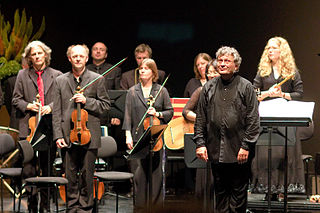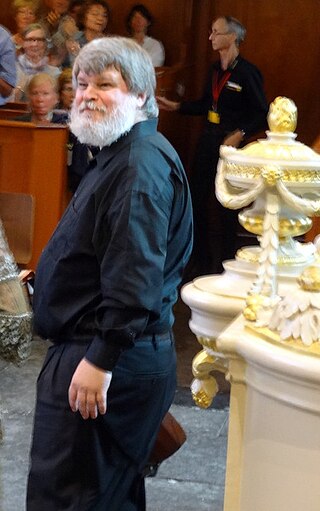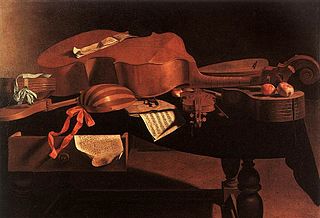The French overture is a musical form widely used in the Baroque period. Its basic formal division is into two parts, which are usually enclosed by double bars and repeat signs. They are complementary in style, and the first ends with a half-cadence that requires an answering structure with a tonic ending. The second section often but not always ends with a brief recollection of the first, sometimes even repeating some of its melodic content.

René Jacobs is a Belgian musician. He came to fame as a countertenor, but later in his career he became known as a conductor of baroque and classical opera.

Pinchgut Opera is a chamber opera company in Sydney, Australia, presenting opera from the 17th and 18th centuries performed on period instruments. Founded in 2002, Pinchgut stages two operas each year in Sydney's City Recital Hall. It also performs concerts in both Sydney and Melbourne.
The year 1685 in music involved some significant events.
Paul Lawrence Vincent Esswood is an English countertenor and conductor. He is best known for his performance of Bach cantatas and the operas of Handel and Monteverdi. Along with his countrymen Alfred Deller and James Bowman, he led the revival of countertenor singing in modern times.

Le Poème Harmonique is a musical ensemble founded in 1998 by Vincent Dumestre to recreate and promote early music, in particular that of the 17th century. Using rare instruments such as the theorbo, the lirone, the tiorbino and the arpa tripla, Le Poème Harmonique aims to recapture the poetry of early music, particularly of the late renaissance and early baroque era. The early 17th-century French and Italian madrigal is a special interest. Le Poème Harmonique also teaches singers in collaboration with the Centre de Musique Baroque at Versailles. The group's recordings with the French Alpha record label of Jean-Paul Combet contributed to the critical and commercial establishment of the label, and included the 1st and 100th releases of the label's primary 'Ut Pictura Musica' series.

Stephen Stubbs is a lutenist and music director and has been a leading figure in the American early music scene for nearly thirty years.

Patricia Petibon is a French soprano.
Amanda Forsythe is an American light lyric soprano who is particularly admired for her interpretations of baroque music and the works of Rossini. Forsythe has received continued critical acclaim from many publications including Opera News, The New York Times, The Wall Street Journal and the Boston Globe.

Les Arts Florissants is a Baroque musical ensemble in residence at the Théâtre de Caen in Caen, France. The organization was founded by conductor William Christie in 1979. The ensemble derives its name from the 1685 opera Les Arts florissants by Marc-Antoine Charpentier. The organization consists of a chamber orchestra of period instruments and a small vocal ensemble. Current notable members include soprano Danielle de Niese and tenor Paul Agnew, who has served as assistant conductor since 2007. Jonathan Cohen is also on the conducting staff; Christie remains the organization's artistic director.

Paul Raymond O'Dette is an American lutenist, conductor, and musicologist specializing in early music.
The French musical ensemble Les Talens Lyriques was created in 1991 in Paris, France, by the harpsichordist and orchestral conductor Christophe Rousset. This instrumental and vocal formation derives its name from the subtitle of Les fêtes d'Hébé (1739) an opera by Jean-Philippe Rameau.
Robert Mealy is a performer and teacher of baroque violin. He holds a joint position at the Yale School of Music and the Department of Music of Yale University, where he directs the Yale Collegium Musicum and teaches classes in musical rhetoric and historically-informed performance. He has recorded over 50 CDs of early music, ranging from Hildegard of Bingen with Sequentia, to Renaissance consorts with the Boston Camerata, to Rameau operas with Les Arts Florissants. At home in New York, he is a frequent leader and soloist with the New York Collegium, Early Music New York, the Clarion Music Society, and the ARTEK early music ensemble.
Agnès Mellon is a French soprano who specializes in baroque music.

Baroque music refers to the period or dominant style of Western classical music composed from about 1600 to 1750. The Baroque style followed the Renaissance period, and was followed in turn by the Classical period after a short transition. The Baroque period is divided into three major phases: early, middle, and late. Overlapping in time, they are conventionally dated from 1580 to 1650, from 1630 to 1700, and from 1680 to 1750. Baroque music forms a major portion of the "classical music" canon, and is widely studied, performed, and listened to. The term "baroque" comes from the Portuguese word barroco, meaning "misshapen pearl". The works of George Frideric Handel and Johann Sebastian Bach are considered the pinnacle of the Baroque period. Other key composers of the Baroque era include Claudio Monteverdi, Domenico Scarlatti, Alessandro Scarlatti, Alessandro Stradella, Tomaso Albinoni, Johann Pachelbel, Henry Purcell, Antonio Vivaldi, Georg Philipp Telemann, Jean-Baptiste Lully, Jean-Philippe Rameau, Marc-Antoine Charpentier, Arcangelo Corelli, François Couperin, Johann Hermann Schein, Heinrich Schütz, Samuel Scheidt, Dieterich Buxtehude, Gaspar Sanz, José de Nebra, Antonio Soler, Carlos Seixas and others.

Núria Rial is a Catalan soprano. In recent years, Rial has specialized in the music of the renaissance and baroque eras, such as the works of Handel and Monteverdi. Her repertoire also includes Johann Sebastian Bach, Mozart opera roles, and German, French, Catalan and Castillian art songs.

Pascal Bertin is a French countertenor.
Kacper Filip Szelążek – Polish singer, countertenor.










